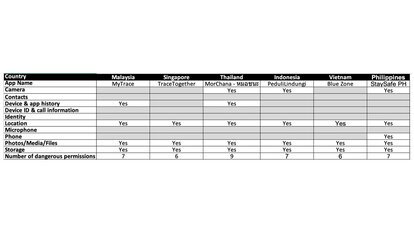Temporary measure or a long-term violation?

It's been seven months since the first COVID-19 case was reported in Wuhan, China. States are trying numerous approaches to “flatten the curve” of infection rate in their own countries. After lockdown impositions, the second most common measure is the use of contact tracing applications. However, tracking applications operated by the state has raised concerns from many people. They consider it as a violation of the privacy of their personal information.
Online Citizen Asia describes the method of contact tracing via app: “The users’ mobile phone exchanges ID-related information of their mobile phones via short-distance Bluetooth signals with other mobile phones with the same app. If a user has been exposed to an infected person who has also downloaded the app, the contact history is then shared with the relevant government agency.” There is reluctance in downloading the app because people are afraid that government is using it as a surveillance system.
The Global Privacy Enforcement Network (GPEN) assessed the privacy sweep methods by these applications by focusing on: 1) the types of permissions sought by a surveyed app, 2) whether those permissions exceeded what would be expected based on the app's functionality, and 3) how the app explained to consumers why it wanted the personal data and what it planned to do with it. From their research, the app that asks the most permissions is Morchana from Thailand, while Singapore’s TraceTogether, and Vietnam’s Blue Zone ask the least permissions.
When these apps are given permission to access one’s phone camera and microphone, it can pose a dangerous threat of unauthorized recording.

Source: https://www.dpexnetwork.org/articles/comparative-review-contact-tracing-apps-asean-countries/
Digital rights are human rights
Article 12 of the Universal Declaration of Human Rights states that: “No one shall be subjected to arbitrary interference with his privacy, family, home or correspondence, nor to attacks upon his honour and reputation. Everyone has the right to the protection of the law against such interference or attacks.” This statement affirms that digital rights are basic human rights, and therefore have to be safeguarded.
Legal mechanisms have been installed to protect such rights. The UN decided to appoint its first UN Special Rapporteur on the Right to Privacy in the Digital Age in 2015. In Europe, there is the General Data Protection Regulation (GDPR). While ASEAN does not have a consensus on such matter, some member states have started implementing personal data protection laws domestically.
With the current political situation in Southeast Asia where violation of human rights has become widespread, people are worried about the possibility of government intruding further into their personal digital space. According to The ASEAN Post, in 2016, the Malaysian government purchased sophisticated technology from companies in Israel “with the ability to monitor and analyze social media and other open-source information.” There has been no public update concerning the use of this technology.
Data privacy intrusion is also flagrant on social media. There are cases where the national budget is used to create pro-government accounts. Countries like Thailand, Vietnam, and Myanmar are reported to employ these dummy profiles to pry, and subsequently attack freedom of expression. Further, Thailand implemented the Computer-Related Crime Act construed to suppress critical dissent against the government. Meanwhile, Vietnam enacted the Cyber Security Act, alarming human rights activists that this legitimizes government surveillance on citizens’ internet activities.
Governments need to clarify the purpose of collecting personal information, and make a commitment that these information are processed fairly and securely. This applies to tracking apps, and any online or offline activity where data are gathered. Digital rights and data protection should be respected for all people.